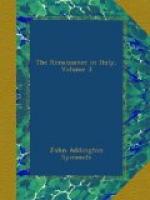“Vex not your pure desire
with tears and sighs;
For he who robs
you of my light, hath none.
Dwelling in fear,
sin hath no happiness;
Since amid those
who love, their joy is less
Whose great desire
great plenty still curtails,
Than theirs who,
poor, have hope that never fails.”
As an artist, owing his advancement to Lorenzo, he had accepted favours binding him by ties of gratitude to the Medici, and even involving him in the downfall of their house. For Leo X. he undertook to build the facade of S. Lorenzo and the Laurentian Library. For Clement VII. he began the statues of the Dukes of Urbino and Nemours. Yet, while accepting these commissions from Medicean Popes, he could not keep his tongue from speaking openly against their despotism. After the sack of Prato it appears from his correspondence that he had exposed himself to danger by some expression of indignation.[296] This was in 1512, when Soderini fled and left the gates of Florence open to the Cardinal Giovanni de’ Medici. During the siege of Florence in 1529 he fortified Samminiato, and allowed himself to be named one of the Otto di Guerra chosen for the express purpose of defending Florence against the Medici.[297] After the fall of the city he made peace with Clement by consenting to finish the tombs of S. Lorenzo. Yet, while doing all he could to save those insignificant dukes from oblivion by the immortality of his art, Michael Angelo was conscious of his own and his country’s shame. The memorable lines placed in the mouth of his “Night,” sufficiently display his feeling after the final return of the Medici in 1530:[298]—
Sweet is my sleep, but more
to be mere stone,
So long as ruin and dishonour
reign;
To hear nought, to feel nought,
is my great gain:
Then wake me not, speak in
an under-tone.
When Clement VII. died, the last real representative of Michael Angelo’s old patrons perished, and the sculptor was free to quit Florence for ever. During the reign of Duke Cosimo he never set foot in his native city. It is thus clear that the patriot, the artist, and the man of honour were at odds in him. Loyalty obliged him to serve the family to whom he owed so much; he was, moreover, dependent for opportunities of doing great work on the very men whose public policy he execrated. Hence arose a compromise and a confusion, hard to accommodate with our conception of his upright and unyielding temper. Only by voluntary exile, and after age had made him stubborn to resist seductive offers, could Michael Angelo act up to the promptings of his heart and declare himself a citizen who held no truce with tyrants. I have already in this work had occasion to compare Dante, Michael Angelo, and Machiavelli.[299] In estimating the conduct of the two last, it must not be forgotten that, by the action of inevitable causes, republican freedom had become in Italy a thing of the past; and in judging between Machiavelli and Michael Angelo, we have to remember that the sculptor’s work involved no sacrifice of principle or self-respect. Carving statues for the tombs of Medicean dukes was a different matter from dedicating the “Prince” to them.




